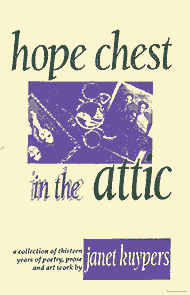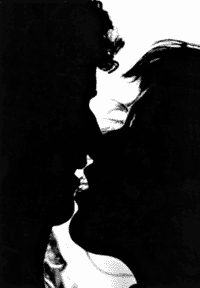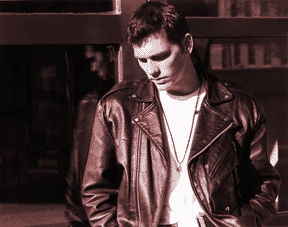Preface
Poetry
 There are two types of poetry writing. One is writing for yourself, the type of writing that you do when your dad hits you or your girlfriend breaks up with you or you’re trying to come to grips with the fact that you think you’re gay. It’s the kind of writing that you do for you, you’re the only one meant to see it, and it eventually gets tucked in a box in the bottom of your closet to be forgotten. There are two types of poetry writing. One is writing for yourself, the type of writing that you do when your dad hits you or your girlfriend breaks up with you or you’re trying to come to grips with the fact that you think you’re gay. It’s the kind of writing that you do for you, you’re the only one meant to see it, and it eventually gets tucked in a box in the bottom of your closet to be forgotten.
 The other type of writing is when you write for an audience, when you want to make a point, when you want to get published. And then your work suddenly becomes very important, because it can be interpreted in many ways. Wouldn’t want anyone to think the wrong things, so you have to be careful with your word choice. The other type of writing is when you write for an audience, when you want to make a point, when you want to get published. And then your work suddenly becomes very important, because it can be interpreted in many ways. Wouldn’t want anyone to think the wrong things, so you have to be careful with your word choice.
 The easiest and probably best way to do this is to avoid explaining emotion. Explain everything in the scene to depict the emotion, and the reader will feel the feeling without having to be told what the emotion is. The emotion will be self-evident. It will be so self-evident, in fact, that the reader can’t avoid it. They couldn’t escape it if they wanted to. You have to set a scene and be as concrete in your description as possible so the reader can feel the wood finish on the bench at the church, or they can smell the glass cleaner from the window they’re reading about leaning on. When the reader is forced to feel the images in the writing, then it suddenly becomes strong, it pulls them into the story, kicking and screaming. The easiest and probably best way to do this is to avoid explaining emotion. Explain everything in the scene to depict the emotion, and the reader will feel the feeling without having to be told what the emotion is. The emotion will be self-evident. It will be so self-evident, in fact, that the reader can’t avoid it. They couldn’t escape it if they wanted to. You have to set a scene and be as concrete in your description as possible so the reader can feel the wood finish on the bench at the church, or they can smell the glass cleaner from the window they’re reading about leaning on. When the reader is forced to feel the images in the writing, then it suddenly becomes strong, it pulls them into the story, kicking and screaming.
 And that’s often frightening, because it seems so real. And that’s often frightening, because it seems so real.
 The easiest way to describe a scene with such vividness is to not write fiction. Study your surroundings in such detail and you’ll realize the vast amount of information your senses overlook. For instance, just think about your body right now. How do your shoulders feel? Are your fingertips cold? Are your legs crossed? Is your hair tickling your forehead? As I’m writing this, I realize that my legs are crossed, and it’s actually quite uncomfortable. In other words, I wouldn’t have even noticed that I was actually in pain unless I made this conscious effort to think about it. We neglect to notice these daily things, these things that make us feel the way we do on a daily basis. And all of these things, when described in a certain way, can portray a mood with more power and strength than ever saying, “I feel tired.” The easiest way to describe a scene with such vividness is to not write fiction. Study your surroundings in such detail and you’ll realize the vast amount of information your senses overlook. For instance, just think about your body right now. How do your shoulders feel? Are your fingertips cold? Are your legs crossed? Is your hair tickling your forehead? As I’m writing this, I realize that my legs are crossed, and it’s actually quite uncomfortable. In other words, I wouldn’t have even noticed that I was actually in pain unless I made this conscious effort to think about it. We neglect to notice these daily things, these things that make us feel the way we do on a daily basis. And all of these things, when described in a certain way, can portray a mood with more power and strength than ever saying, “I feel tired.”
 I try to do that with my writing, and sometimes people wonder if I’m disturbed. I try to do that with my writing, and sometimes people wonder if I’m disturbed.
 And sometimes, when people say that, I feel flattered. That’s when I know I’m doing something right. And sometimes, when people say that, I feel flattered. That’s when I know I’m doing something right.
 But I think there are two reasons that people are scared of this kind of work. One is because the emotions I present are painful, and it reminds people of similar experiences of their own that are painful. Many people have gone through pains like some that are described on one level or another in this book. Most, however, want to hide it. But I think there are two reasons that people are scared of this kind of work. One is because the emotions I present are painful, and it reminds people of similar experiences of their own that are painful. Many people have gone through pains like some that are described on one level or another in this book. Most, however, want to hide it.
 Some of the emotions (not all, but some) are emotions I have gone through at one time or another, and believe me, I’ve tried to stop the hurting from those feelings. But the pain only started to subside when I wrote it down. When I felt I did something about it. When I validated my own feelings. When I accepted those feeling as mine and took them beyond mere thoughts. Some of the emotions (not all, but some) are emotions I have gone through at one time or another, and believe me, I’ve tried to stop the hurting from those feelings. But the pain only started to subside when I wrote it down. When I felt I did something about it. When I validated my own feelings. When I accepted those feeling as mine and took them beyond mere thoughts.
 The first step toward healing from a pain is accepting the pain, accepting the problem. The second step is expressing that pain. Then it is easier to come to terms with it and move on. I think what frightens people about my writing is that it’s about things they don’t want to think about, they don’t want to accept. I’m going so far as to express them, what gall she has, how dare she do that... But I think I’m stronger for it in the end. I’ve taken that pain and I’ve changed it into something constructive, something to be proud of. Something to learn from. The first step toward healing from a pain is accepting the pain, accepting the problem. The second step is expressing that pain. Then it is easier to come to terms with it and move on. I think what frightens people about my writing is that it’s about things they don’t want to think about, they don’t want to accept. I’m going so far as to express them, what gall she has, how dare she do that... But I think I’m stronger for it in the end. I’ve taken that pain and I’ve changed it into something constructive, something to be proud of. Something to learn from.
 The second reason why people may not like the harshness of this work is because they view it as reading nonfiction about a bitter, hurtful person. The second reason why people may not like the harshness of this work is because they view it as reading nonfiction about a bitter, hurtful person.
 And this isn’t true. And this isn’t true.
 Some of the work in this book was written for an audience. Some was written for me, and possibly should have stayed in the box in the bottom of the closet. Some of the work in this book is fiction. Some of it is not. Some works have truth and lies so woven into each other that I couldn’t even tell you what was the truth anymore. And I don’t know if I’d want to. Some of the work in this book was written for an audience. Some was written for me, and possibly should have stayed in the box in the bottom of the closet. Some of the work in this book is fiction. Some of it is not. Some works have truth and lies so woven into each other that I couldn’t even tell you what was the truth anymore. And I don’t know if I’d want to.
 I just want you to feel like you have been sucked in by this work, that hands have come ripping out from the very fibers of the page itself and taken a stranglehold on you. That you’ve just lived it all. I just want you to feel like you have been sucked in by this work, that hands have come ripping out from the very fibers of the page itself and taken a stranglehold on you. That you’ve just lived it all.
 Don’t try to figure it out. Just try to feel like you’re there. Don’t try to figure it out. Just try to feel like you’re there.


Introduction: Acquaintance Rape Education
Nonfiction
 Let me tell you a story about a woman. I can’t tell you her name, because the law prevents me. Let me tell you a story about a woman. I can’t tell you her name, because the law prevents me.
 You see, this woman is the typical victim of a stranger rape. She was walking down the street after getting off of a late train from work and she was cornered by a man with a knife. She was violated, she was hurt, she had the blood stains and bruises to prove it. And she decided she wanted to report it. You see, this woman is the typical victim of a stranger rape. She was walking down the street after getting off of a late train from work and she was cornered by a man with a knife. She was violated, she was hurt, she had the blood stains and bruises to prove it. And she decided she wanted to report it.
 She went to the hospital the next morning, after she put on an extra layer of clothing and huddled in her bed the night before, trying to sleep. The doctors took her clothing for evidence, and then they took samples. She went to the hospital the next morning, after she put on an extra layer of clothing and huddled in her bed the night before, trying to sleep. The doctors took her clothing for evidence, and then they took samples.
 She leaned back in a cold chair half-naked in a doctor’s office, feet in straps three feet apart, and then they took samples from inside her to see if they could prove who was there. They pulled fifty hairs from her head and twenty-five pubic hairs with their fingers to compare them to what they brushed off her. She leaned back in a cold chair half-naked in a doctor’s office, feet in straps three feet apart, and then they took samples from inside her to see if they could prove who was there. They pulled fifty hairs from her head and twenty-five pubic hairs with their fingers to compare them to what they brushed off her.
 She then talked to the police. Because she couldn’t identify him, because he had time to flee, because the police couldn’t match the evidence to anyone, she couldn’t find justice. She then talked to the police. Because she couldn’t identify him, because he had time to flee, because the police couldn’t match the evidence to anyone, she couldn’t find justice.
 But her friends helped her through this. They slept in her room with her at night, when she didn’t want to be alone. They listened to her. They accepted her. And she was able to take the first steps toward recovering. But her friends helped her through this. They slept in her room with her at night, when she didn’t want to be alone. They listened to her. They accepted her. And she was able to take the first steps toward recovering.
 It’s a sad story, isn’t it? She didn’t deserve it. But it seems, especially with her attempts to find her attacker and with the support she received, that she may be able to eventually get over the pain. It’s a sad story, isn’t it? She didn’t deserve it. But it seems, especially with her attempts to find her attacker and with the support she received, that she may be able to eventually get over the pain.
 Now I would like to tell you the story of another woman. I could tell you her name, but I told her I wouldn’t. Now I would like to tell you the story of another woman. I could tell you her name, but I told her I wouldn’t.
 She begged me not to. She begged me not to.
 She’s a junior at a state university. The first day she came to college, the day she moved in, her boyfriend raped her. She’s a junior at a state university. The first day she came to college, the day she moved in, her boyfriend raped her.
 He gave her roommate so much alcohol that she passed out, and wouldn’t know what was going on. He gave his victim so much alcohol that she could barely think or move. During the course of the evening she wondered why her boyfriend was pushing alcohol on her roommate. Now she knows, hindsight is 20/20, and now she feels guilty. She should have said something to him, she thought, but what could she have said at the time? And why should she have suspected anything? He gave her roommate so much alcohol that she passed out, and wouldn’t know what was going on. He gave his victim so much alcohol that she could barely think or move. During the course of the evening she wondered why her boyfriend was pushing alcohol on her roommate. Now she knows, hindsight is 20/20, and now she feels guilty. She should have said something to him, she thought, but what could she have said at the time? And why should she have suspected anything?
 She didn’t go to the hospital. She thought something was wrong with her only because she didn’t want him. She thought what happened was normal. She couldn’t understand why she was so hurt. She didn’t go to the hospital. She thought something was wrong with her only because she didn’t want him. She thought what happened was normal. She couldn’t understand why she was so hurt.
 She didn’t tell anyone. She didn’t talk to her boyfriend about it --- in fact, she didn’t even break up with him until weeks later, when she couldn’t take it anymore and had to come up with an excuse to avoid him. She didn’t tell anyone. She didn’t talk to her boyfriend about it --- in fact, she didn’t even break up with him until weeks later, when she couldn’t take it anymore and had to come up with an excuse to avoid him.
 No one understood why she was acting so strangely. No one understood her mood swings. No one understood why she would break into tears for no reason. She would stand in the bathroom of her dormitory, look in the mirror, and cry before she took her morning shower. She looked so tired in the mirror those mornings, like she had been attacked just the night before. No one understood why she was acting so strangely. No one understood her mood swings. No one understood why she would break into tears for no reason. She would stand in the bathroom of her dormitory, look in the mirror, and cry before she took her morning shower. She looked so tired in the mirror those mornings, like she had been attacked just the night before.
 She waited about six months before she told anyone. She told one friend. He did everything he could to help her. But there wasn’t much he could do. She never told her family. She felt ashamed. She felt alone. She waited about six months before she told anyone. She told one friend. He did everything he could to help her. But there wasn’t much he could do. She never told her family. She felt ashamed. She felt alone.
 And as she told more people, she received more support. But it only came one year, two years later. And as she told more people, she received more support. But it only came one year, two years later.
 You see, even though it wasn’t her fault, and even though she had help from her friends, she still couldn’t help but think that she could have done something to stop it. She teased him. She was drunk. You see, even though it wasn’t her fault, and even though she had help from her friends, she still couldn’t help but think that she could have done something to stop it. She teased him. She was drunk.
 He was her boyfriend. He was her boyfriend.
 Now, these are two pretty depressing stories, I know. But when people hear the word “rape,” they tend to think of story number one first. The man could have been jumping out from a bush, an alley, or breaking into her home in the middle of the night, as long as he was a stranger. He had a weapon. It was a crime. But both of these stories are similar, because they both are rape. Pure and simple. According to Illinois law, for example, if a woman is intoxicated, she cannot consent to sex, just as she cannot consent to driving a car. That alone defines what the second woman went through as rape. Her feelings, her pain, also define it as such. But still, the endings to these stories are very different. Now, these are two pretty depressing stories, I know. But when people hear the word “rape,” they tend to think of story number one first. The man could have been jumping out from a bush, an alley, or breaking into her home in the middle of the night, as long as he was a stranger. He had a weapon. It was a crime. But both of these stories are similar, because they both are rape. Pure and simple. According to Illinois law, for example, if a woman is intoxicated, she cannot consent to sex, just as she cannot consent to driving a car. That alone defines what the second woman went through as rape. Her feelings, her pain, also define it as such. But still, the endings to these stories are very different.
 Let’s imagine that the woman in the second story pressed charges against her boyfriend. Better yet, let’s take another crime, like a mugging in an alley, and ask the victim the same types of questions the woman in the second story, or even the woman in the first story, would be asked. Let’s imagine that the woman in the second story pressed charges against her boyfriend. Better yet, let’s take another crime, like a mugging in an alley, and ask the victim the same types of questions the woman in the second story, or even the woman in the first story, would be asked.
 We’ll set the scene: A man leaves a bar that he entered after work, took a short cut home and was mugged in an alley. He is now at the stand, testifying, being questioned by the defense. We’ll set the scene: A man leaves a bar that he entered after work, took a short cut home and was mugged in an alley. He is now at the stand, testifying, being questioned by the defense.
 “Now, let me understand this - you were in a bar, drinking.” “Now, let me understand this - you were in a bar, drinking.”
 “Yes.” “Yes.”
 “And you were talking to strangers, you even flashed around your money around.” “And you were talking to strangers, you even flashed around your money around.”
 “I bought a few people a beer. That’s all.” “I bought a few people a beer. That’s all.”
 “You bought a few strangers a beer. And what you were wearing - it was a nice suit. And your watch - it had to cost a lot. What were you doing in a neighborhood like that wearing clothes like that if you didn’t want to be mugged?” “You bought a few strangers a beer. And what you were wearing - it was a nice suit. And your watch - it had to cost a lot. What were you doing in a neighborhood like that wearing clothes like that if you didn’t want to be mugged?”
 “That’s not the point. I -” “That’s not the point. I -”
 “And you left the bar, and it was late. What time was it, sir?” “And you left the bar, and it was late. What time was it, sir?”
 “12:30 in the morning.” “12:30 in the morning.”
 “Did you think it was safe for you to be walking alone at night, especially looking the way you did, in the neighborhood you were in?” “Did you think it was safe for you to be walking alone at night, especially looking the way you did, in the neighborhood you were in?”
 “Well -” “Well -”
 “Let me ask you another question. Have you ever given money to a charity before?” “Let me ask you another question. Have you ever given money to a charity before?”
 “Yes, but I don’t see how that -” “Yes, but I don’t see how that -”
 “Now if you’re just giving it away freely, you’ve done it in the past, hey, you even bought drinks for complete strangers at the bar just hours before, then why wouldn’t this man think you were giving it away now?” “Now if you’re just giving it away freely, you’ve done it in the past, hey, you even bought drinks for complete strangers at the bar just hours before, then why wouldn’t this man think you were giving it away now?”
 “Because, he was robbing me -” “Because, he was robbing me -”
 “Well, did you see a weapon? Do you know for a fact that he had a weapon? And did you scream, yell, fight back at all” “Well, did you see a weapon? Do you know for a fact that he had a weapon? And did you scream, yell, fight back at all”
 “He had something in his pocket, I thought it was a gun. I didn’t want to yell, I thought he’d hurt me. I panicked.” “He had something in his pocket, I thought it was a gun. I didn’t want to yell, I thought he’d hurt me. I panicked.”
 “But you didn’t see a weapon, you didn’t yell, you were wearing that suit and flashing your money, you were in a bar and you were walking alone in a bad neighborhood late at night. Really, sir, some people would say you were asking for it.” “But you didn’t see a weapon, you didn’t yell, you were wearing that suit and flashing your money, you were in a bar and you were walking alone in a bad neighborhood late at night. Really, sir, some people would say you were asking for it.”
 Society tends to blur the lines between sex and violence when the attacker is someone you know. The sexes are antagonistic toward each other: this is just an extreme. Men are taught to chase women, to try liquor or money to get a woman in bed, and women are taught to hold out sexually, which naturally puts the sexes against each other. Society tends to blur the lines between sex and violence when the attacker is someone you know. The sexes are antagonistic toward each other: this is just an extreme. Men are taught to chase women, to try liquor or money to get a woman in bed, and women are taught to hold out sexually, which naturally puts the sexes against each other.
 Women in society are taught to be “feminine”, to be giving, and to be weak instead of assertive. They are taught to look good for men, and they are taught that they are nothing unless they get married. They are taught that all they have is intuition, but it is usually wrong and they shouldn’t stand up for it. If a woman doesn’t feel comfortable in a situation, it is probably all just in her head and she should just get over it. Women in society are taught to be “feminine”, to be giving, and to be weak instead of assertive. They are taught to look good for men, and they are taught that they are nothing unless they get married. They are taught that all they have is intuition, but it is usually wrong and they shouldn’t stand up for it. If a woman doesn’t feel comfortable in a situation, it is probably all just in her head and she should just get over it.
 Men in society are taught to think of sex as a competition -- by “scoring” and “getting some” -- instead of thinking of it in terms of love and affection. Looking at terms for sex in today’s society shows this perfectly: scoring, banging, bopping, hammering, nailing, pumping, bagging. All are violent terms, and half of them are related to either hunting or building, typically male dominated activities. Men in society are taught to think of sex as a competition -- by “scoring” and “getting some” -- instead of thinking of it in terms of love and affection. Looking at terms for sex in today’s society shows this perfectly: scoring, banging, bopping, hammering, nailing, pumping, bagging. All are violent terms, and half of them are related to either hunting or building, typically male dominated activities.
 Men are taught to look at women as objects - making them feel less than human, making them feel as if they should serve men. Harassment at the workplace, obscene phone calls, stalkers, wife beating, pornography, cat calls and whistling at woman on the street - none of these things would happen if this wasn’t the case. Men are taught to look at women as objects - making them feel less than human, making them feel as if they should serve men. Harassment at the workplace, obscene phone calls, stalkers, wife beating, pornography, cat calls and whistling at woman on the street - none of these things would happen if this wasn’t the case.
 And women are taught to make themselves objects for men, to bend over backwards to makes themselves beautiful. Make-up, long styled hair, shaving their hair, wearing skirts, or high heels - half of these things are painful, and the other half are time-consuming, yet women are taught to do these things for men. And women are taught to make themselves objects for men, to bend over backwards to makes themselves beautiful. Make-up, long styled hair, shaving their hair, wearing skirts, or high heels - half of these things are painful, and the other half are time-consuming, yet women are taught to do these things for men.
 And maybe the woman in the second story knew she had friends she could trust, but still couldn’t break free from what society taught her. And maybe the woman in the second story knew she had friends she could trust, but still couldn’t break free from what society taught her.
 If you want a happy ending here, you’re not going to find one. Not for these two women. If you want a happy ending here, you’re not going to find one. Not for these two women.
 But maybe it would be easier for women to heal from rape if men and women began to see each other as people and not as just sexes. But maybe it would be easier for women to heal from rape if men and women began to see each other as people and not as just sexes.
 Maybe then rape would end, too. Maybe then rape would end, too.
 And then there would be a happy ending for everybody. And then there would be a happy ending for everybody.
 It is reported in some surveys that one out of every four women will be raped before they leave college, and that one out of three women will be raped in their lifetime. And 90% of these crimes are by someone they know (either someone they know well, like a boyfriend, husband or family member, or by someone they know, but not well, a coworker, a classmate, someone they met at a party or a bar earlier that night). It is reported in some surveys that one out of every four women will be raped before they leave college, and that one out of three women will be raped in their lifetime. And 90% of these crimes are by someone they know (either someone they know well, like a boyfriend, husband or family member, or by someone they know, but not well, a coworker, a classmate, someone they met at a party or a bar earlier that night).
 A University survey in Illinois reported that the three most common places for a rape to occur were: (1) in a dormitory, (2) the man’s house/apartment, or (3) in a fraternity house. In other words, it doesn’t happen in back alleys or behind bushes. It happens because the woman knew the man, and felt comfortable with going to his house. It happens because the man won the woman’s trust. A University survey in Illinois reported that the three most common places for a rape to occur were: (1) in a dormitory, (2) the man’s house/apartment, or (3) in a fraternity house. In other words, it doesn’t happen in back alleys or behind bushes. It happens because the woman knew the man, and felt comfortable with going to his house. It happens because the man won the woman’s trust.
 Or it happened because the woman didn’t really like the idea of going over to his place, or letting him in to her apartment after he walked her home, but felt like she couldn’t tell him no, that she owed it to him. That maybe after a while he’d just leave. She wouldn’t want to sound rude. Or it happened because the woman didn’t really like the idea of going over to his place, or letting him in to her apartment after he walked her home, but felt like she couldn’t tell him no, that she owed it to him. That maybe after a while he’d just leave. She wouldn’t want to sound rude.
 Women, as a rule, don’t “cry rape,” or falsely accuse someone of raping them. Most are frightened so much by the system that they don’t even report it, and the incidence of “crying rape” is currently at about 2%, which is comparable to national averages for robbery. It is estimated that as many as 90% of all rapes go unreported, which is drastically higher than other violent crimes. Women, as a rule, don’t “cry rape,” or falsely accuse someone of raping them. Most are frightened so much by the system that they don’t even report it, and the incidence of “crying rape” is currently at about 2%, which is comparable to national averages for robbery. It is estimated that as many as 90% of all rapes go unreported, which is drastically higher than other violent crimes.
 And why are so many women frightened by the judicial process? Because many times women are blamed for the rape, by men as well as women. Because men still equate this act of violence with the act of sex. Because on the stand, a woman has to defend her past, defend what she was wearing, explain why she went to his place, why she was alone with him, why she kissed him. The accused’s past is protected, and in essence, the woman becomes the one on trial. And why are so many women frightened by the judicial process? Because many times women are blamed for the rape, by men as well as women. Because men still equate this act of violence with the act of sex. Because on the stand, a woman has to defend her past, defend what she was wearing, explain why she went to his place, why she was alone with him, why she kissed him. The accused’s past is protected, and in essence, the woman becomes the one on trial.
 Many people want to blame the woman, however, because it’s simply the easiest way. No one wants to go through life believing that a violent crime like this can just happen to them, for no known reason. If the woman is at fault, then she can change her behavior and not be at risk of being raped again. And other women can feel safe if they just don’t let the wrong things happen. And men can feel safe that they’re not doing the wrong thing. When in fact they may be. Many people want to blame the woman, however, because it’s simply the easiest way. No one wants to go through life believing that a violent crime like this can just happen to them, for no known reason. If the woman is at fault, then she can change her behavior and not be at risk of being raped again. And other women can feel safe if they just don’t let the wrong things happen. And men can feel safe that they’re not doing the wrong thing. When in fact they may be.
 And the effects of rape are longstanding. Some women leave the city they lived in, worked in, had friends and family in, because they are afraid they will see their attacker again. Some women have extreme difficulty ever sustaining an intimate relationship with a man again. Some women never tell their experience to another person, keeping their feelings bottled inside, eating away at them. And the effects of rape are longstanding. Some women leave the city they lived in, worked in, had friends and family in, because they are afraid they will see their attacker again. Some women have extreme difficulty ever sustaining an intimate relationship with a man again. Some women never tell their experience to another person, keeping their feelings bottled inside, eating away at them.
 The world is a difficult place to live in for a person who is a rape survivor. Their values no longer make sense to them: if you can’t trust a boyfriend, if someone you cared about could do this to you, what else could happen? The world is a difficult place to live in for a person who is a rape survivor. Their values no longer make sense to them: if you can’t trust a boyfriend, if someone you cared about could do this to you, what else could happen?
 Different women react to rape in different ways, and the time it takes to recover from it varies greatly. Some will say you never recover. Many go through denial. After admitting it to herself, a rape survivor then begins to face those difficult questions: why did this happen to me? What did I do to deserve this? How could he do this? Can I ever tell anyone? Can I ever be close to another man again? Can I ever trust again? Different women react to rape in different ways, and the time it takes to recover from it varies greatly. Some will say you never recover. Many go through denial. After admitting it to herself, a rape survivor then begins to face those difficult questions: why did this happen to me? What did I do to deserve this? How could he do this? Can I ever tell anyone? Can I ever be close to another man again? Can I ever trust again?
 Telling others also helps, because positive support from her friends will make her feel that her feelings of anger or hostility are justified, that it wasn’t her fault, that she can get over it. But she may still harbor ill feelings for years, she may shy away from all relationships, she may become a man-hater, she may go on “sex-binges,” using men the way she felt she was used, taking her revenge on others, and still not feeling any better. Telling others also helps, because positive support from her friends will make her feel that her feelings of anger or hostility are justified, that it wasn’t her fault, that she can get over it. But she may still harbor ill feelings for years, she may shy away from all relationships, she may become a man-hater, she may go on “sex-binges,” using men the way she felt she was used, taking her revenge on others, and still not feeling any better.
 The thing is, something can be done to stop this. Attitudes about women in general have to change, for sexism as a whole gives some men the mentality that this really isn’t a crime. I mean, I bought her dinner, and what do I get for it? She’s been holding out on me for so long, what is she trying to do? I gotta get some, and I know she wants me. It’s not a crime, it’s sex. The thing is, something can be done to stop this. Attitudes about women in general have to change, for sexism as a whole gives some men the mentality that this really isn’t a crime. I mean, I bought her dinner, and what do I get for it? She’s been holding out on me for so long, what is she trying to do? I gotta get some, and I know she wants me. It’s not a crime, it’s sex.
 On the following pages are some of what I have written and created because of sexism and rape. It’s a shame to have to see this work exist. Hopefully in time we as a culture will be able to make a change. On the following pages are some of what I have written and created because of sexism and rape. It’s a shame to have to see this work exist. Hopefully in time we as a culture will be able to make a change.
 Most seem to feel that an act of rape, acquaintance or stranger, is just too bizarre to actually have no reason for happening, so most will look for a solution to the puzzle - an action that caused the rape, something to safeguard people from it. It may seem too strange to think that a man you’ve never met before could just come out of a bush, pick you out and attack you. It may seem too strange to think that a friend, or a boyfriend, or someone that you thought you could trust, could turn on you in such a way for no apparent reason and hurt you so much. In this world, things don’t just happenÑ there’s a reason for things, and there is sense in the world. Besides, the victim probably brought themselves into the trouble and therefore deserved what they got. If we as onlookers just don’t make the same mistakes that they did, we won’t have the same problems that they did. In this way unexplainable, traumatic acts such as rape can be explained away and therefore be easier to handle. Most seem to feel that an act of rape, acquaintance or stranger, is just too bizarre to actually have no reason for happening, so most will look for a solution to the puzzle - an action that caused the rape, something to safeguard people from it. It may seem too strange to think that a man you’ve never met before could just come out of a bush, pick you out and attack you. It may seem too strange to think that a friend, or a boyfriend, or someone that you thought you could trust, could turn on you in such a way for no apparent reason and hurt you so much. In this world, things don’t just happenÑ there’s a reason for things, and there is sense in the world. Besides, the victim probably brought themselves into the trouble and therefore deserved what they got. If we as onlookers just don’t make the same mistakes that they did, we won’t have the same problems that they did. In this way unexplainable, traumatic acts such as rape can be explained away and therefore be easier to handle.
 This is the line of reasoning that many people go through, and it is commonly called “victim blaming.” It seems to make sense at times, but there is a note that we as a society have to remember: just as a robbery victim doesn’t ask to be mugged, a survivor of sexual assault doesn’t ask to be raped. No matter what reasons people come up with to defend a rapist, she was wearing provocative clothing, she was drunk, she kissed him - none of those things means that she consented to have sex with him. This is the line of reasoning that many people go through, and it is commonly called “victim blaming.” It seems to make sense at times, but there is a note that we as a society have to remember: just as a robbery victim doesn’t ask to be mugged, a survivor of sexual assault doesn’t ask to be raped. No matter what reasons people come up with to defend a rapist, she was wearing provocative clothing, she was drunk, she kissed him - none of those things means that she consented to have sex with him.
 If a woman can victim blame another woman, then she can eventually say to herself, “That has never happened to me, so it must have been something she did. Well, if I don’t do what they did, then I will be safe.” Since women have to live with the fear of rape all the time, victim blaming makes them feel better about the irregularities of the world. If a man blames a woman, it may be because he can’t understand that another man - possibly someone that he knows, possibly a friend - can do what the accused did. If another man has the capacity to do that, than that male onlooker may have that capacity, too. It’s a frightening thought to think that you could be a rapist. The man may eventually say, “I couldn’t do that, and therefore that other guy couldn’t do that. It must have been something that she did.” If a woman can victim blame another woman, then she can eventually say to herself, “That has never happened to me, so it must have been something she did. Well, if I don’t do what they did, then I will be safe.” Since women have to live with the fear of rape all the time, victim blaming makes them feel better about the irregularities of the world. If a man blames a woman, it may be because he can’t understand that another man - possibly someone that he knows, possibly a friend - can do what the accused did. If another man has the capacity to do that, than that male onlooker may have that capacity, too. It’s a frightening thought to think that you could be a rapist. The man may eventually say, “I couldn’t do that, and therefore that other guy couldn’t do that. It must have been something that she did.”
 Many victims will even blame themselves for what happened. I should have been more explicit in what I wanted. I shouldn’t have had so much to drink. I shouldn’t have been so nice to him. I should have said something afterwards: to him, to the police, to myself. Many victims will even blame themselves for what happened. I should have been more explicit in what I wanted. I shouldn’t have had so much to drink. I shouldn’t have been so nice to him. I should have said something afterwards: to him, to the police, to myself.
 If there is a reason for everything, then there must be a reason for something as insane as rape - even if the reason doesn’t seem immediately apparent. Maybe, as many come to think, maybe the reason that it happened is because the victim led her attacker on or didn’t do enough to stop him. When someone blames the victim, the behavior is then correctable, and when the victim corrects that ‘wrong’ behavior, then they feel not only safer, but also a better person for correcting their own faults. If one keeps looking over the pieces of the puzzle, something will fall into place and make it all understandable, all comprehensible. If you keep looking for what the victim did wrong, you’ll find something, and then you will be able to explain away what happened. If the victim is blamed for what happened, then the problem of rape is solvable, avoidable, and correctable. It makes the world make sense again. If there is a reason for everything, then there must be a reason for something as insane as rape - even if the reason doesn’t seem immediately apparent. Maybe, as many come to think, maybe the reason that it happened is because the victim led her attacker on or didn’t do enough to stop him. When someone blames the victim, the behavior is then correctable, and when the victim corrects that ‘wrong’ behavior, then they feel not only safer, but also a better person for correcting their own faults. If one keeps looking over the pieces of the puzzle, something will fall into place and make it all understandable, all comprehensible. If you keep looking for what the victim did wrong, you’ll find something, and then you will be able to explain away what happened. If the victim is blamed for what happened, then the problem of rape is solvable, avoidable, and correctable. It makes the world make sense again.
 Victim blaming may, however, give women a false sense of security, if they feel they are safe by taking certain precautions, but not others. It s possible to be more aware of what is happening around you, to always stay with friends in social situations, to avoid walking in bad neighborhoods at night, but that doesn’t mean that you are at fault if something happened to you. And it doesn’t mean others are at fault if they were attacked. Victim blaming may, however, give women a false sense of security, if they feel they are safe by taking certain precautions, but not others. It s possible to be more aware of what is happening around you, to always stay with friends in social situations, to avoid walking in bad neighborhoods at night, but that doesn’t mean that you are at fault if something happened to you. And it doesn’t mean others are at fault if they were attacked.
 When a woman speaks at a trial about someone who attacked her, instantly her past becomes important, her sexual history, what she was wearing, and so on. And the defendant’s criminal history is barred from use in the case, even if he was convicted of sexual crimes in the past. Instantly the woman is on trial, and the survivor of the rape is tried and not the rapist. When a woman speaks at a trial about someone who attacked her, instantly her past becomes important, her sexual history, what she was wearing, and so on. And the defendant’s criminal history is barred from use in the case, even if he was convicted of sexual crimes in the past. Instantly the woman is on trial, and the survivor of the rape is tried and not the rapist.
 It’s hard to understand something like rape. But that’s exactly what a survivor of an attack needs. It’s hard to understand something like rape. But that’s exactly what a survivor of an attack needs.
|

 See YouTube video of Janet Kuypers reading her poem “The Burning” from the Janet Kuypers poetry book
See YouTube video of Janet Kuypers reading her poem “The Burning” from the Janet Kuypers poetry book
 “Hope Chest in the Attic” for public access television in her 2020 “Nafas” interview/poetry show, for “8 poems, 8 days, 8 invites” poems for The Russian Almanac #PeetMeNotLeave (posted on Facebook, Twitter, Pinterest, Instagram, and Tumblr).
“Hope Chest in the Attic” for public access television in her 2020 “Nafas” interview/poetry show, for “8 poems, 8 days, 8 invites” poems for The Russian Almanac #PeetMeNotLeave (posted on Facebook, Twitter, Pinterest, Instagram, and Tumblr).
























